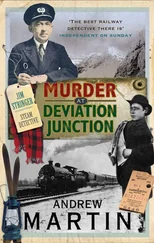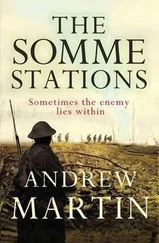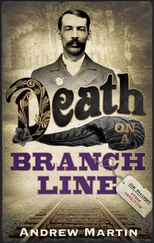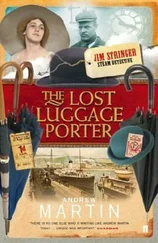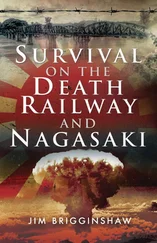Andrew Martin - The Necropolis Railway
Здесь есть возможность читать онлайн «Andrew Martin - The Necropolis Railway» весь текст электронной книги совершенно бесплатно (целиком полную версию без сокращений). В некоторых случаях можно слушать аудио, скачать через торрент в формате fb2 и присутствует краткое содержание. Жанр: Детективная фантастика, на английском языке. Описание произведения, (предисловие) а так же отзывы посетителей доступны на портале библиотеки ЛибКат.
- Название:The Necropolis Railway
- Автор:
- Жанр:
- Год:неизвестен
- ISBN:нет данных
- Рейтинг книги:5 / 5. Голосов: 1
-
Избранное:Добавить в избранное
- Отзывы:
-
Ваша оценка:
- 100
- 1
- 2
- 3
- 4
- 5
The Necropolis Railway: краткое содержание, описание и аннотация
Предлагаем к чтению аннотацию, описание, краткое содержание или предисловие (зависит от того, что написал сам автор книги «The Necropolis Railway»). Если вы не нашли необходимую информацию о книге — напишите в комментариях, мы постараемся отыскать её.
The Necropolis Railway — читать онлайн бесплатно полную книгу (весь текст) целиком
Ниже представлен текст книги, разбитый по страницам. Система сохранения места последней прочитанной страницы, позволяет с удобством читать онлайн бесплатно книгу «The Necropolis Railway», без необходимости каждый раз заново искать на чём Вы остановились. Поставьте закладку, и сможете в любой момент перейти на страницу, на которой закончили чтение.
Интервал:
Закладка:
My boots rattled on the wood, but those of the toff, which were buttoned at the side, made no noise as we entered the waiting room. All the windows were open, but the fire was orange and seething, and the coal and paraffin smell made the place so stifling that we would have been much better off outside. But it was too late for that.
'Do you want some more coals on the fire?' I said – a strange remark, all things considered, but anxiety had brought on a brainstorm.
The man wiped his brow with a blue handkerchief. 'Why not?' he said, and I thought: now, that is gentlemanliness for you. He removed his hat, causing his hair to spring up, and that is how I remember Rowland Smith. You took one look at his surprising curls, and you thought: Brilliantine – he needs Brilliantine on his hair. I picked up the poker and prodded some coals. 'I could see you on a footplate,' he said.
'Oh, I feel I could put up some wonderful running, sir,' I said, 'giving a thin, even fire at all times, with the coal put exactly on the spot where it is needed.' Fancying myself quite a bit, I picked up the tongs and moved one lump from the back of the grate to the front, as if that really meant something.
'My name is Rowland Smith,' he said, and at the same moment, almost laughing, took two steps forward and shook my hand.
I was so startled by this that at first I forgot to give my own name in return.
'If you like high speed,' said Smith, unbuttoning his coat, 'then why are you portering?' Now this, I thought, is the very question.
Smith took out a silver cigarette case -1 had been right over this – and began to hit one of the cigarettes on the back of it; it was engraved on the front. The black floorboards were going one way, the sunbeams another. He struck a match.
'I know it will be a difficult transition to make, sir,' and I carried on without a particle of fear, but I am committed to a life on the footplate.'
It was the most important remark I had ever made, and the following words, mixed with smoke, came out of Smith's mouth: "The path that leads to success must be pursued through all its asperities and obliquities.' 'I shall remember that, sir,' I said.
A silence fell between us and I perceived that the time had come to make one further leap. 'Do you have any involvement with the London networks, sir?'
He gave me a half nod, and said, 'Have you heard of the South Western Railway?'
'The London and South Western? Only this week I was reading of the excellent timings for ocean passengers between Plymouth and London.' 'Indeed. Have you ever been over South Western metals?'
'No, but I've read so much concerning that excellent company that I do feel acquainted with its territories.' 'In The Railway Magazine?' I nodded.
'I thought so,' he said. "They're always looking out for engine cleaners to come on, you know, and these fellows are on the footplate as passed firemen, working, for example, slow-goods in not above six months.'
'You have a very close acquaintance with the network?' I said. 'I am a railway man through and through,' said Smith.
Well, you do not look it, I thought, and I looked this thought of mine straight at him, and he could see it for what it was: a sporting challenge.
'I'm getting on pretty well here,' I said. 'Of course, footplate work would be much more like it, but my father was anxious…'
At this I faltered, but Rowland Smith nodded and said: 'Go on.' 'He wanted me at a desk, sir.' 'He is no doubt a respectable gentleman.' 'He is a butcher.'
Smith made a face that I fancied meant: well, it's better than nothing.
'The South Western needs firemen,' he said, 'which is to say that it needs drivers.'
'But I am here,' I said in desperation. And at that moment the rooks circling over the trees, half a mile above the signal box, started making their lonely noise, and the whole place seemed like a graveyard that I had to get out of.
'I will have a letter sent up to you care of this station from the headquarters of the South Western,' said Smith. 'What is your name?'
I gave him my name along with many assurances that, if given a chance, I would not be found wanting; then his train came. In a flurry I helped him up into a first-class compartment, passed his box to him, and he gave me no money, as befitting a platform hand who was really an engine man in disguise. When the train left, I returned to the empty waiting room and sat there alone until the heat from the fire and the heat from the sun had faded away, at which moment, try as hard as I might, I could not remember what either one had felt like.
Chapter Six
Tuesday 17 November – Friday 20 November
On my second morning as a Nine Elms man, I woke to find that the pool on the floor of my lodge and the black mark on the ceiling had been added to considerably. I looked out of the window: it was raining hard, and London in the rain, with all the colour and light gone, frightened me. So too, and for the first time, did thoughts of a life on the railways.
It was as though I had brought down a curse on myself for coming out with the name of Rowland Smith, I decided as I pulled on my boots. Arthur Hunt, who may have looked like a wolf but was the only man I had so far met who was the right sort, had dismissed me from the rough steps of the half-link drivers' mess and gone back to his paper. Vincent had stared after me, while the somewhat friendlier fellow, Barney Rose, had given a half smile through the window as if to say, 'I'm sorry for you, mate, but what can I do?' I had spent the rest of the day wandering around Nine Elms in a daze, with only the token in my pocket to say I had a job at all.
I went out into the dark street. The saturated man was there, banging his stick, and the queer thing was that from the look of his face you could tell he was aiming at solemnity. There was a great roaring coming from within the station. It was somewhere between the wind trapped in a chimney and the elephant house at a zoo. I bought a cup of coffee and a cheese sandwich from the barrow under the railway viaduct in Westminster Bridge Road, from which a whole gang of people seemed to get their living. On the other side of the street were three women, not going anywhere. They were next to a brazier with half the cinders tipped out of it. They were all beautiful, but too thin and too dirty, part of the very street. As I looked, one of them said something to another, and this second one turned and gave me a look I could not understand. Later, I thought there might have been a question in it – a notion that set my head spinning.
I drained my cup and set off on my new route from the lodge to Nine Elms: into Westminster Bridge Road with the trams already racing in the rain, then down the steps to the Embankment, with the black river to my right, and the wet, dark gardens to my left. Continuing west, I struck a district of factories: a distillery with high windows that made yellow patterns on the dark water, two gasworks and a brewery. I felt very compressed as I walked along that narrow path between the silent factories and the river, but it did save ten minutes on my journey.
In the gatehouse I tried to give a cheery 'Hello' to Mr Crook. I had decided to put from my mind the first day; I would start all over again in the hopes of this time seeking out some men a bit more like driver Hughes in The Railway Magazine, as well as getting a leg in with the ones of a more ordinary sort. But Crook just kept his head bent over his metal chequerboard. He had pinned up over the fireplace a new article concerning the weather: 'MORE FOG', it said, but I hadn't noticed any so far, only rain. When he gave me the token, it was with no friendly word, or any word at all.
Things got worse too, for I was stopped on the ash patch before the sheds by a red-headed fellow who said he was Flannagan, the charge cleaner. He was at an angle because he had one leg longer than the other; he also should have been Irish with a name like that but he was not. None of these things was his fault but they made me take against him, and he had certainly taken against me.
Читать дальшеИнтервал:
Закладка:
Похожие книги на «The Necropolis Railway»
Представляем Вашему вниманию похожие книги на «The Necropolis Railway» списком для выбора. Мы отобрали схожую по названию и смыслу литературу в надежде предоставить читателям больше вариантов отыскать новые, интересные, ещё непрочитанные произведения.
Обсуждение, отзывы о книге «The Necropolis Railway» и просто собственные мнения читателей. Оставьте ваши комментарии, напишите, что Вы думаете о произведении, его смысле или главных героях. Укажите что конкретно понравилось, а что нет, и почему Вы так считаете.

